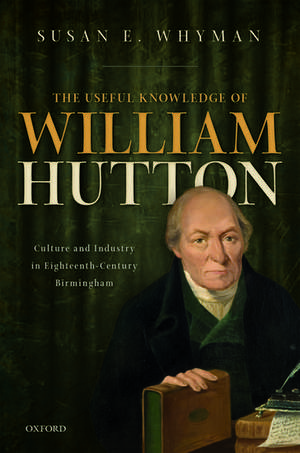The Useful Knowledge of William Hutton: Culture and Industry in Eighteenth-Century Birmingham
Autor Susan E. Whymanen Limba Engleză Hardback – 4 oct 2018
Preț: 354.00 lei
Preț vechi: 403.77 lei
-12% Nou
Puncte Express: 531
Preț estimativ în valută:
62.63€ • 72.97$ • 54.69£
62.63€ • 72.97$ • 54.69£
Carte disponibilă
Livrare economică 26 decembrie 25 - 06 ianuarie 26
Livrare express 16-20 decembrie pentru 89.86 lei
Preluare comenzi: 021 569.72.76
Specificații
ISBN-13: 9780198797838
ISBN-10: 0198797834
Pagini: 240
Ilustrații: 50 black and white figures/illustrations
Dimensiuni: 163 x 242 x 19 mm
Greutate: 0.59 kg
Editura: OUP OXFORD
Colecția OUP Oxford
Locul publicării:Oxford, United Kingdom
ISBN-10: 0198797834
Pagini: 240
Ilustrații: 50 black and white figures/illustrations
Dimensiuni: 163 x 242 x 19 mm
Greutate: 0.59 kg
Editura: OUP OXFORD
Colecția OUP Oxford
Locul publicării:Oxford, United Kingdom
Recenzii
...but the detailed analysis...presents a wonderful picture...
One of Whyman's strengths across this volume is her close engagement with archival material. The text is, as such, multi-voiced-we can engage with Hutton as public andprivate figure but also with a range of primary evidence, whether in his sister's letters, or the testimony, and life-histories, of others who thrived in Birmingham's entrepreneurial atmosphere.
Whyman makes a strong argument for the importance of local culture and individual agency in facilitating British industrialization, contending that it was people like Hutton and towns like Birmingham that made industrialization possible ... her work effectively reverses the assumptions guiding many social and micro-histories that focus on identifying representative past ideas, values, and experiences.
A fascinating account.
One of Whyman's strengths across this volume is her close engagement with archival material. The text is, as such, multi-voiced-we can engage with Hutton as public andprivate figure but also with a range of primary evidence, whether in his sister's letters, or the testimony, and life-histories, of others who thrived in Birmingham's entrepreneurial atmosphere.
Whyman makes a strong argument for the importance of local culture and individual agency in facilitating British industrialization, contending that it was people like Hutton and towns like Birmingham that made industrialization possible ... her work effectively reverses the assumptions guiding many social and micro-histories that focus on identifying representative past ideas, values, and experiences.
A fascinating account.
Notă biografică
Susan Whyman is an independent historian, formerly of Princeton University, where she received both MA and PhD degrees. Whyman lectures and publishes widely, both in England and the US, on British culture. She is a fellow of the Royal Historical Society and the author of The Pen and the People: English Letter Writers, 1660-1800, winner of the 2010 Modern Language Association Prize for Independent Scholars; Sociability and Power: The Cultural Worlds of the Verneys, nominated for the History Today Prize; and Walking the Streets of Eighteenth-Century London: John Gay's Trivia (1716), co-edited with Clare Brant (all published by Oxford University Press).
